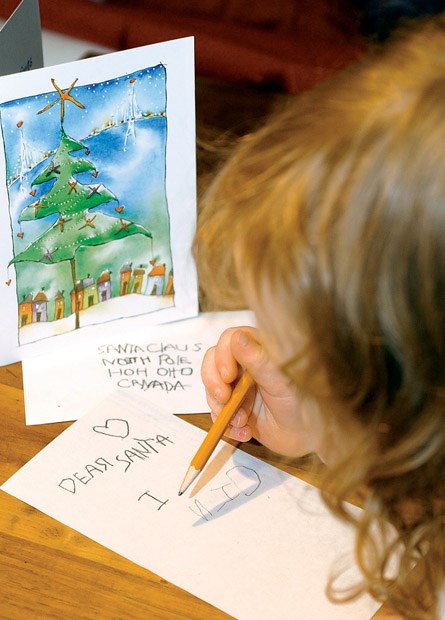We are two weeks away from Christmas and even people who never make lists are now making them.
We have gift lists, social calendar list, the company's coming list, the baking and cooking list, the decorating list and the general to-do list.
Goodness gracious, how will we ever cope? I know that some of you are lying awake, night after night, with the lists dancing in front of your eyes.
Put away the lists for a minute and allow yourself to dream. What would the perfect holiday season look like? Would you see yourself having the time to play with the kids, relaxing and having some real chats with your siblings or parents or going out for a splendid romantic meal with your spouse or partner? What is your dream?
And that goes to the very top of the list, in capital letters, in boldface. It comes first! Now, I recommend you invoke the rule of thirds. Take a look at your list and put all the items in order of priority. And by that I don't mean the things you believe you must do, but the things that make the holiday special for you and your family. As a matter of fact, include the family in the discussion. You may find that the gingerbread house that you make and lovingly decorate is nice but doesn't really matter much to anyone, including you. So it goes to the bottom of the list.
Now, your list is in order of priority. Fold it into thirds. Take the bottom third and throw it in the recycle can. Take the middle third and put in a drawer.
What you have left is the stuff that really matters. You can do this with all the lists. You do not need to go to all the parties unless you want to. You do not need to entertain constantly unless you love to.
The middle section, the list in the drawer, can come out if you have extra time and energy.
A challenging list is the kid's wish list. It makes sense to have them mark down a few ideas of things they would like. It's a lovely wish list. But then suddenly it's no longer a wish list; it becomes a list of expectations. And as holiday advertising becomes more prevalent, the list grows.
While there are a number of things you can do to reduce your children's acquisitive nature, the simplest (but for many, most difficult) way to handle the problem is to learn to use just one little word. No. He doesn't need all that stuff.
His life won't be ruined if he doesn't always have the latest, newest and greatest thing. In fact, his life is more likely to be ruined in the long run if he gets everything he wants exactly when he wants it.
If we teach our children to sometimes go without, we are doing them a favour. This will not make you at all popular but parenting is not a popularity contest. It's your job to sometimes say no and live with that but not give in to your unhappy child.
When you see the milelong list, let him know right away that it's a wish list. That some of the things on the list might make it under the tree.
Teach your kids to be savvy consumers. Watch toy commercials with them and make a game out of trying to determine how they made that toy look so good? Do they think it's really that big? What about batteries? Does it need batteries and how can kids afford to pay for them? Once kids are seven or eight they love the game of figuring out what the advertising is doing to make things look so good. You can even take them to the toy store to look at the toy and see how the reality is sometimes quite different from the ad. Have them go online and research the reviews of the toys.
Involve your children in gift purchases. They should use some of their own money to buy gifts for their parents and siblings. When they only receive and never give, they miss half the joy of the gift exchange.
When my children were young, each year we all headed off one Saturday morning in December. We would avoid the malls and go downtown. We found it was pretty quiet first thing in the morning and something about going downtown made it feel more special. It was an outing. I took one child and John took the other. Then we traded kids so each child could buy for their parents and keep it a secret.
And one rule was: the child got to choose the gift. So we got some strange and unusual offerings but we received them with good grace and our kids were so proud of their purchases. We truly modelled, 'it's the thought that counts."
To make the shopping trip even more special, we would then go out for lunch. It became an annual Christmas ritual that actually started when I was a kid and my dad took my sisters and I shopping for our mom.
Focus on the process and not the stuff, and the kids learn to wish for things, not automatically expect them.



